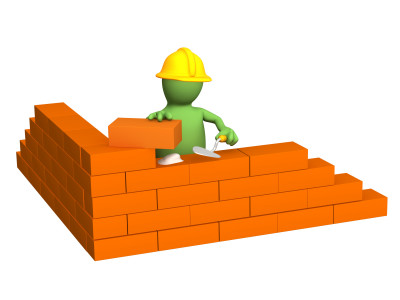
We hear it everywhere: “I’ve hit this brick wall!”
Or worse, “I’ve hit this brick wall. This problem just can’t be solved!”
Or even worse, “I’ve hit this brick wall. There’s nothing more to be found. So I’ll just make a decision on the basis of what I already have.”
Ah, yes. Frustration, hopelessness, and folly.
Whenever we think we see a brick wall, it’s time to reevaluate what we did that built that wall. It's time to evaluate what we have and what we think we know.
“Brick walls” in research usually boil down to one of ten situations:
- We have not done thorough research. Odds are, we’re used to just "finding stuff" by using a search engine's search box—rather than systematically identifying every type of record that exists for the time and place, tracking down every one of them, and thoroughly combing every one of them for every shred of evidence we can milk from them.
- We have not accurately interpreted the language of the record. Words change meaning across time. Words have different meanings in different contexts. Words such as infants and orphans, found in an old legal record, don’t mean what they mean in everyday usage today.
- We haven’t correlated our evidence thoroughly. When we gather documents, extract certain “facts” into our database, and file the document away in our fantabulous digital filing system, we’re sending each piece of evidence into an isolation chamber. (Remember that the "evidence" is not the document. The "evidence" rests on each specific assertion within the document.) Problem solving requires us to evaluate every assertion in every relevant document against every assertion in every other relevant document. The whole is so much greater than the sum of its parts.
- We’re looking for direct evidence when we use each source. We’re looking for explicit statement of facts that directly answer our burning questions, rather than training ourselves to recognize and use indirect evidence.
- We’re trusting direct evidence that is totally wrong—or wrong enough to mislead us. Just because a source gives us an answer to our question, we can’t trust that it’s correct. We have to do that thorough research (Point 1) and thoroughly correlate everything we find (Point 3) to determine whether any piece of direct evidence from one source is right or wrong.
- We’re trusting information from a derivative source, without seeking the original record to ensure that the derivative is accurate. The dangers here are legion.
- We haven’t analyzed our person’s evidence against his life cycles and the things a person of his class and his occupation in his society did at each stage of life. Ergo, we assign to him documents and activities that belong to some other same-name person—or else we miss activities we should pursue.
- We haven’t adequately studied the context of the time and circumstances in which this person lived. Laws, local economies, political events, religious activities, and cultural patterns—on both local and national stages—all help us understand the person or subject we are researching. All give us clues, if we tune our antennae to that indirect evidence we talked about under Point 4, above.
- We haven’t studied the FAN of our elusive person to find what those friends, associates, and neighbors said about him in their own records. Or what they said about themselves that gives us clues: i.e., possibilities we can investigate for him. Or, more commonly, we haven’t studied that FAN thoroughly enough, because researching everybody connected to him, as thoroughly as we research him, seems like way-too-much work.
- We haven’t tried to “write up” our findings. That writing stage—where we attempt to tell a person’s story based on the “facts” we have accumulated, or attempt to argue the case we want to “prove”—will always, always, ALWAYS(!) flag holes in our research and flaws in our logic. That’s where and how we find new chisels and sledgehammers we can use to dismantle that brick wall.
IMAGE SOURCE:
"3d Puppet—Builder, Building a Brick Wall Stock Illustration," CanStockPhoto (https://www.canstockphoto.com/3d-puppet-builder-building-a-brick-1129699.html : downloaded 8 December 2014), csp1129699, uploaded by Frenta, 6 November 2008; used under license.
HOW TO CITE:
Elizabeth Shown Mills, "10 Ways We Build Our Own Brick Walls," blog post, QuickTips: The Blog @ Evidence Explained (https://www.evidenceexplained.com/quicktips/10-ways-we-build-our-own-brick-walls : posted 17 December 2018).